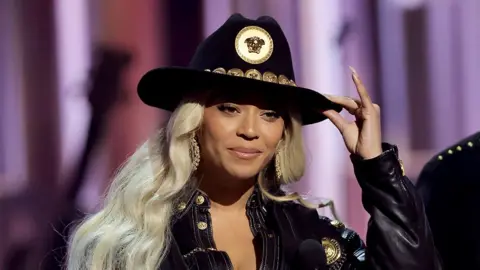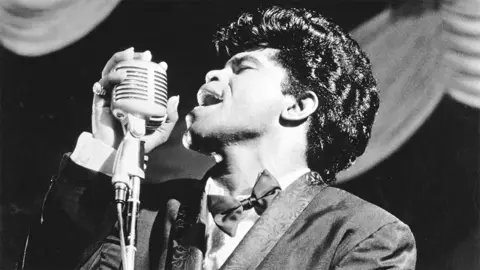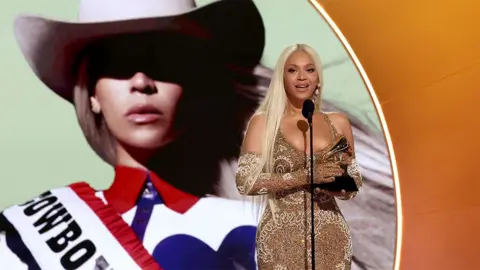The story behind Beyoncé's Chitlin' Circuit tour name
 Getty Images
Getty ImagesPre-sale sign-up done. Phone ready. Hoping and praying that you'll bag tickets for Beyoncé's upcoming Cowboy Carter and the Rodeo Chitlin' Circuit Tour.
All of that doesn't leave you much time to think about the meaning behind the name.
Cowboy Carter is, obviously, the name of Beyoncé's latest album.
But "Chitlin' Circuit" might raise some questions in your mind.
What's the Chitlin' Circuit?
From the late 1880s until the 1960s, so-called Jim Crow laws enforced segregation against black Americans and saw them treated as second-class citizens.
It meant that they were separated from white people - often prevented from living in certain neighbourhoods, forced to attend different schools and banned from public spaces.
During this era, black musicians and performers created their own network of live performance venues across the United States.
Known as the Chitlin' Circuit, it took its name from "Chitterling" - a dish made with pig's intestines popular in the south, where Jim Crow laws were most prevalent.
Venues were considered safe and acceptable spaces for black musicians, comedians and audiences and gave many pioneering performers a platform to hone their craft.
Almost every notable black musician of the time graced the circuit at some point, including stars such as Aretha Franklin, Diana Ross, Tina Turner, Jimi Hendrix and James Brown.
 Getty Images
Getty ImagesThe circuit was "tremendously important to the development of black music", says Mia Bay, Professor of American History at Cambridge University.
"The black stars of the day would travel the circuit," she tells BBC Newsbeat.
"It was very important to sustaining the careers of many important black performers - it allowed them to make a living in music.
"They were on the road all the time."
Prof Bay says the presence of the circuit was also "very helpful to black communities".
Performers were drawn to "black vacation spots" and the theatres at those locations, Prof Bay says.
"This would in turn help the careers of these entertainers," she says.
"It was one of the more successful segregation-era businesses."
 Getty Images
Getty ImagesBeyoncé has often paid tribute to black performers, and Prof Bay feels the singer's Texas roots may have played a role in that.
"[It] was very much a segregated state, so this would be something that would be a very direct reference in terms of where she grew up and how she thinks about American history.
"I also think she, in some ways, has a nostalgic reference, because it was such a communal circuit with a lot of performers," she says.
The star's latest tour stops off at notable Chitlin' Circuit cities such as Houston and Chicago.
Beyoncé fan and music history content creator Nat Brown feels that's not a coincidence.
Unlike Renaissance, this tour is smaller with only eight cities being played in total globally, with six of those in the US.
"It's a very small tour," says Nat.
"Just like it historically was with the Chitlin' Circuit, where you only went to seven to 10 places.
"And if people were able to see you - great. But most often, people missed out because you blazed through town and went to the next spot."
She thinks the purpose of using "Chitlin' Circuit" as part of the title is to educate people who may not know about it.
Beyoncé's previous album, Renaissance explored the forgotten influence of black and queer communities on house music.
And Cowboy Carter, which recently won a best album Grammy, delves further into the history of black American musicians.
Nat says: "I think it's bringing back something old and making it new again.
"This is bringing something to younger generations.
"Being able to see your favourite artist play and things like that and really have that bonding and kind of cultural experience.
"That's what she's trying to bring back," Nat says.

